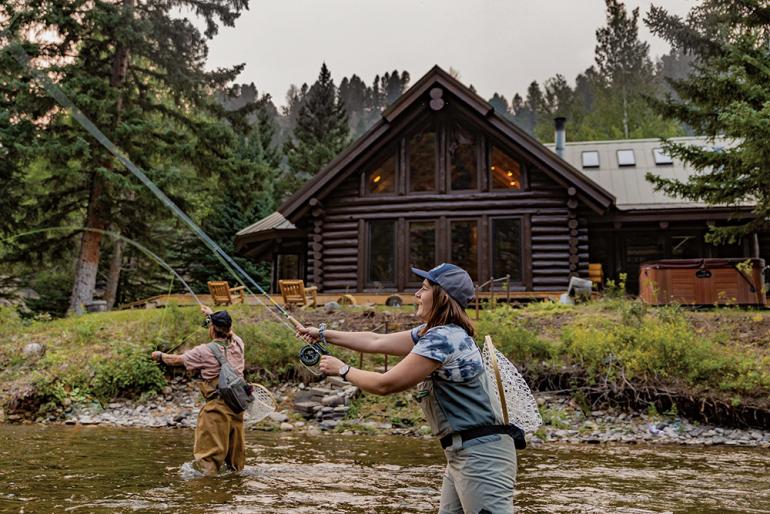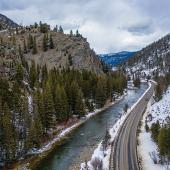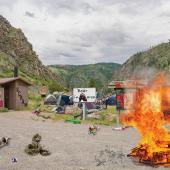Like a Good Neighbor
Re-thinking the concept of courtesy.
Most of us are courteous people. At least in Montana, anyway. So when we find ourselves intruding on others, we back off. Which is the proper behavior, right? Well, maybe, maybe not.
Case in point: one summer a few years ago, I and three friends hiked upstream and settled into a deep pool on the Gallatin. We swam, drank beer, and threw sticks for the dogs. We were rowdy. So when a family emerged from their riverfront house and set up a picnic on a high bank above us, we felt as if we were ruining their experience. I called up and said as much, apologizing and asking if they’d like us to leave. “This is your river, too,” the father said. “We chose to live here… what right do we have to make you leave?”
That moment changed my attitude. It takes two to tango, after all, and just because one party is inconveniencing another, doesn’t mean that the one being inconvenienced is in the right. Oftentimes, the converse is true—as was the case on the Gallatin that summer day, with the rational fellow who held himself accountable for his choices. Unfortunately, these kinds of encounters happen all the time, and courteous people everywhere are backing off. They shouldn’t, nor should they feel compelled to by uptight homeowners who can’t see beyond their own self-interest. What right, indeed.
In Montana, when people build or buy a house on a riverbank, there’s a risk—of running into other people. And around bustling Boz Angeles, it’s not just a risk, it’s a likelihood. The state’s stream-access law allows travel within normal high-water marks, which in many cases puts an angler, birdwatcher, or other recreationist close enough to smell the morning coffee wafting from the homeowner’s kitchen. Said recreationist generally feels like he’s intruding on another’s personal space—and so he backs off. But if someone built a house next to a landing strip, and you were a pilot, would you stop flying there? If someone built a house next to a shooting range, would you cancel your membership and shoot somewhere else?
It’s not just the riverbed. State school-trust land is legally accessible by the public, but wealthy homeowners often act as if it’s their own. All over southwest Montana, people have built houses right along the property line. Courteous recreationists tend to veer away from said property line, so as to not invade the homeowner’s privacy. But if the homeowners wanted privacy, why didn’t they set their house back a ways?
Fact is, they made their beds and they have to sleep in them. Otherwise, they’re monopolizing space that belongs to everyone, relying on others’ courtesy to receive a disproportionate and undeserved share.
Come hunting season, things get even worse. State law prohibits discharging a firearm within 400 yards of a home, without permission from the homeowner. So when a person builds a house next to state land, they basically have a private hunting retreat in a quarter-mile radius around their house, for the entire rifle season. They’ve appropriated the public’s land for their own personal use. And we’re supposed to back off, be courteous, and give them their space—the very space they’ve taken from us? A quote from Abraham Lincoln comes to mind: A hypocrite is someone who murders his parents and then pleads for mercy on the grounds that he’s an orphan.
So, homeowners, I’m talking to you. If you live next to a river, expect to see anglers and floaters. If you live adjacent to public land, expect to see hikers and hunters. And don’t expect them to leave. Instead, wave a friendly hello. Be a good neighbor. Be nice. If you do, odds are they’ll be nice in return, moving on as soon as possible, to give you the space of which you are now more deserving—precisely because you didn’t expect it. Ironic, perhaps, but kindness begets kindness.
The opposite, of course, is also true. Last fall, I was bowhunting some state land on the edge of town, near a large, expensive house that had been erected just a few yards from the property line. As I emerged from a nearby thicket, a woman came out and started yelling at me. She was hysterical, screaming all kinds of insults and accusations. At one point she threatened to call the police, accusing me of trespassing, harassment, and peeping on her octogenarian mother. I laughed at the last one, but I didn’t apologize for any of it. Had she been nice, I would’ve left her in peace, that day and every day thereafter. But she wasn’t. So I just waited for her to finish her diatribe and then said, before walking away, “Maybe you shouldn’t have built your house so close to public land.” The next day, I stopped by her mailbox and inserted a copy of the state law allowing me to hunt on school-trust land. And my conscience was perfectly clear.













